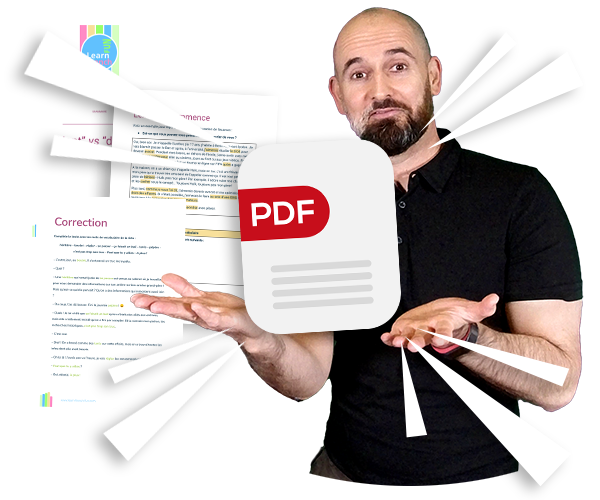When learning French, there are certain things that you just have to know. How to conjugate verbs is one of those things for French students.
There are more difficult tenses, such as the subjunctive, and easier ones, such as the future proche tense or, as we’ll see now, the imperative.

PDF Bonus
We have prepared a free PDF to help you master the imperative in French.
👉 Download it for free
At the end, you will have exercises to practice with the correction. 👍
In this post, we will go over the imperative mood in French and when you need to use it. Trust me, once you understand this concept, your French will improve dramatically! So let’s get started…
When you listen to French people talk, especially if, for practice, you listen to French-speaking Youtubeurs, you’ll notice that they use the imperative a lot.
The French imperative is a verb form that is used to :
- give orders,
- make requests,
- or give instructions.
The imperative is conjugated without pronouns. The conjugation of the verb is different depending on whether you are addressing:
- one person
- or more than one person.
How to form the conjugation of the imperative in French?
Imperative for the French verbs of the 1st group (-er)
For verbs of the 1st group, that is, verbs ending in -er (90% of verbs in French), here is how to form the imperative, take the stem of the verb (the same as in present tense) and add the following endings:
- -e for singular verbs addressed to tu,
- -ons for plural verbs addressed to nous,
- -ez for plural verbs addressed to vous.
For example, the conjugation of the verb parler (to speak) in the imperative would be as follows:
– Parle (singular, addressed to tu)
– Parlons (plural, addressed to nous)
– Parlez (plural, addressed to vous)
Here you have to be careful not to put a final -s for the form tu.
📍 In the French conjugation, this is the only exception where we don’t put a final -s to the form tu!
Imperative for other French verbs
For other French verbs, the formation of the imperative is based on the formation of the present. This means that if you already know the present tense, then you know the imperative!
📍 Be careful with the final -s:
If the verb you are conjugating has the final (e) sound, then you don’t put an -s. It’s the same rule as for the verbs of the 1st group.
For example:
The verb ouvrir (to open).
In the present tense → j’ouvre.
So in the imperative :
- ouvre !
- ouvrons !
- ouvrez !
But, as we will see later, there are small exceptions…
And yes, it’s French 😂
Do you like learning French with videos?
Receive our free video newsletter every Friday in your e-mail box. You will get 3 “Tips & Tricks” on grammar, vocabulary, phonetics or French culture.
👉👉 Sign up now!
Table of conjugation of the imperative in French
| Présent | Impératif | |
| parler | tu parles nous parlons vous parlez | Parle ! Ne parle pas ! Parlons ! Ne parlons pas ! Parlez ! Ne parlez pas ! |
| attendre | tu attends nous attendons vous attendez | Attends ! N’attends pas ! Attendons ! N’attendons pas ! Attendez ! N’attendez pas ! |
| se doucher | Tu te douches Nous nous douchons Vous vous douchez | Douche-toi ! Ne te douche pas ! Douchons-nous ! Ne nous douchons pas ! Douchez-vous ! Ne vous douchez pas ! |
Irregular verbs in the French imperative
Of course, otherwise French would not be French, there are irregular verbs.
But there are two pieces of good news:
- The first is that there are only four irregular verbs
- The second, it will help you with the subjunctive, because the subjunctive of three of these four irregular verbs is identical to the imperative! You will have already done fast half of the work for the subjunctive 👍😀
The four irregular verbs in the French imperative
These are the verbs: être (to be), avoir (to have), savoir (to know), vouloir (to want).
| être | Sois ! Soyons ! Soyez ! |
| avoir | Aie ! Ayons ! Ayez ! |
| savoir | Sache ! Sachons ! Sachez ! |
| vouloir | Veux ! Voulons ! Voulez ! (sustained form: veuillez !) |
Small exceptions in the spelling of the imperative in French
The French verb “aller” to imperative
We have already seen in the rule that we do not put a final -s to verbs ending in -e. This is the case for all the verbs of the 1st group and the case of some verbs of the 2nd and 3rd group – the other verbs in French – which have their present tense with an -e in the je form.
In addition, there is the exception of the verb aller (to go).
The tu form of the verb aller in the imperative is: Va ! Without -s.
But sometimes, in the imperative, we put the final -s!
This is the case when the imperative verb is followed by the pronouns “en” or “y“.
To take the example of the verb aller:
- Va !
- Vas-y !
Or the verb parler (to speak) :
- Parle !
- Parles-en !
When do you have to use the French imperative?
The imperative is widely used in everyday life by the French. It is often summarized as the idea of giving orders, but not only.
It is used in these three cases:
- give orders,
- make requests,
- or give instructions.
Imperative to give orders
Sir, yes Sir!
Every parent knows this, but until the age of 8-9, 80% of parent-child interactions consist of prohibitions. And the imperative is perfect to express this:
- Mange ! (Eat!)
- Finis ton assiette ! (Finish your plate!)
- Ne touche pas ça, c’est dangereux ! (Don’t touch that, it’s dangerous!)
- Attends ! (Wait!)
- Va dormir ! (Go to sleep!)
Imperative to make requests or to give advices
To give advice, the use of the imperative is shared equally with the conditional. Traditionally, French students are taught that advice in French is given with the conditional:
- Tu devrais prendre ton parapluie car il risque de pleuvoir. (You should take your umbrella because it might rain).
But in everyday language, the imperative is widely used for the same function:
- Prends ton parapluie car il risque de pleuvoir. (Take your umbrella because it might rain).
Imperative to give instructions
The last use of the French imperative is to give a list of instructions.
If you like to cook – you’re learning French, so I’m sure you at least like gastronomy 😂 – you’ll find many recipes written using the imperative:
- Prends ceci… (Take this)
- Coupe cela… (Cut that)
- Mets ceci dans cela… (Put this in that)
- etc.
Or if you like building things in kit form… Even if manufacturers are more and more content to just put diagrams without a word.
✔️ French QUIZ
French imperative
Before leaving, let’s take this little quiz together to see if you understand 😀
Results
#1. Quel est l'impératif du verbe TRAVAILLER à la forme "tu" ?
#2. Quel est l'impératif du verbe AVOIR à la forme "nous" ?
#3. Quel est l'impératif du verbe ÊTRE à la forme "vous" ?
#4. Est-il possible de mettre un /s/ final à l'impératif du verbe PARLER à la forme "tu" ?
#5. Je peux utiliser l'impératif pour donner un conseil à quelqu'un.
The imperative is an important part of the French language, and it’s one that you will definitely want to be familiar with. It can be used in a variety of situations, from giving orders to making requests or giving instructions.
In order to form the conjugation of the imperative, you need to know which group the verb belongs to. For verbs that end in -er, the conjugation is simple – all you have to do is add on the appropriate ending.
There are other groups of verbs, as well as some irregular verbs, that also follow specific rules when it comes to forming the imperative mood.
So study up on these rules and put them into practice so you can start using this essential part of French grammar.
Articles that might interest you:
- The Imperative in French: How to Conjugate Verbs in Imperative? When do You Have to Use the Imperative?
- The 10 Irregular Verbs in the French Subjunctive Mood
- Depuis, pendant, en, il y a, dans
- All the secrets of the French gerund!
- French verb moods
- How to use the tonic pronouns in French?
- How to use “en” and “y” pronoun in French?
- Difference between DONT and DUQUEL in French
- 10 common French verbs conjugated in the present tense. Beware of traps!
- The Direct Object Complement in French (C.O.D.) and direct complement pronouns (le, la, les…)







4 thoughts on “The Imperative in French: How to Conjugate Verbs in Imperative? When do You Have to Use the Imperative?”
Comments are closed.